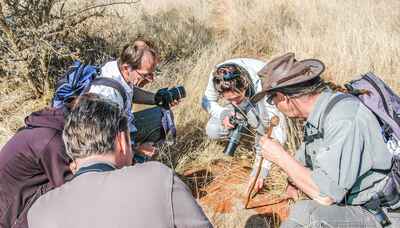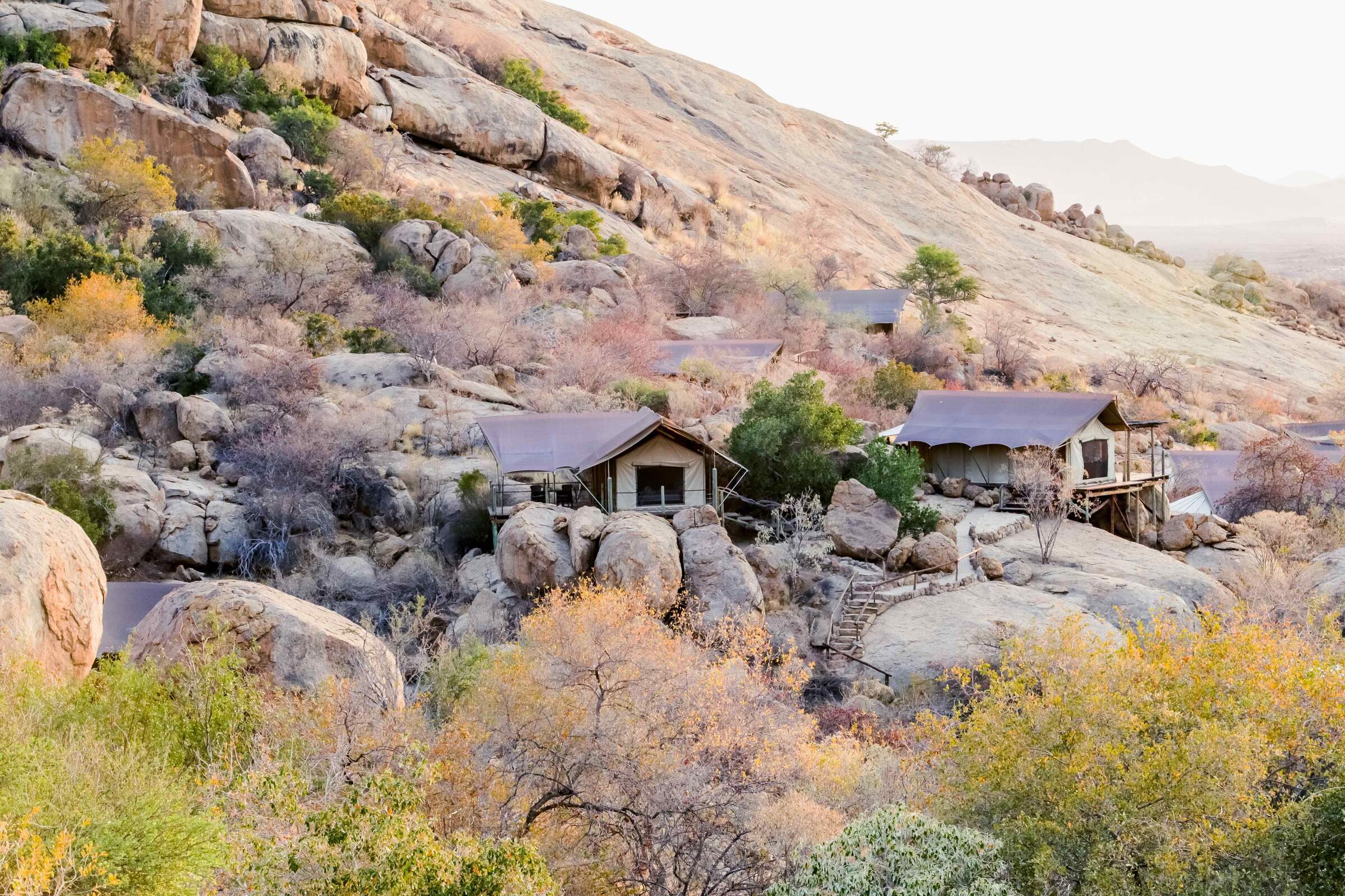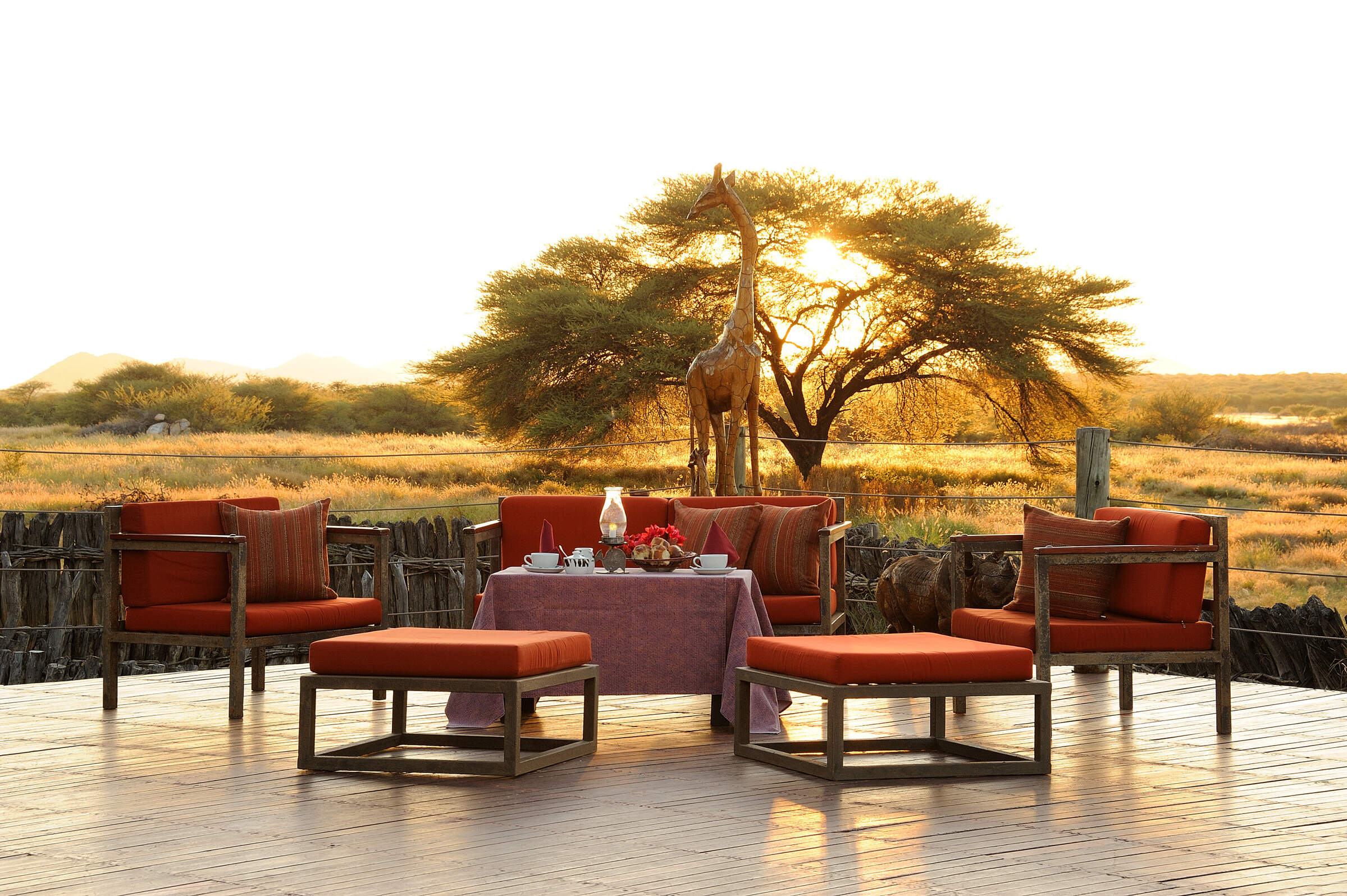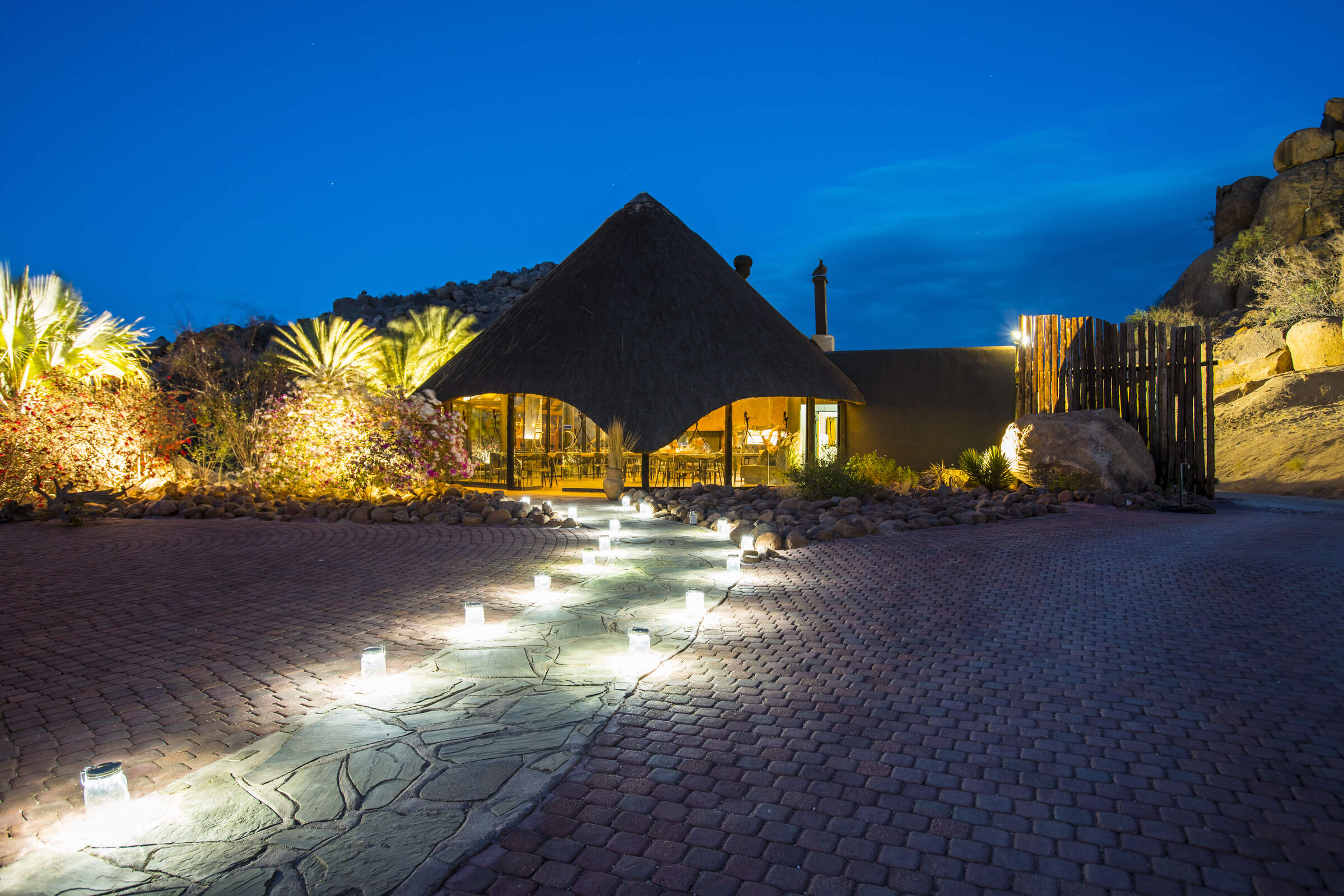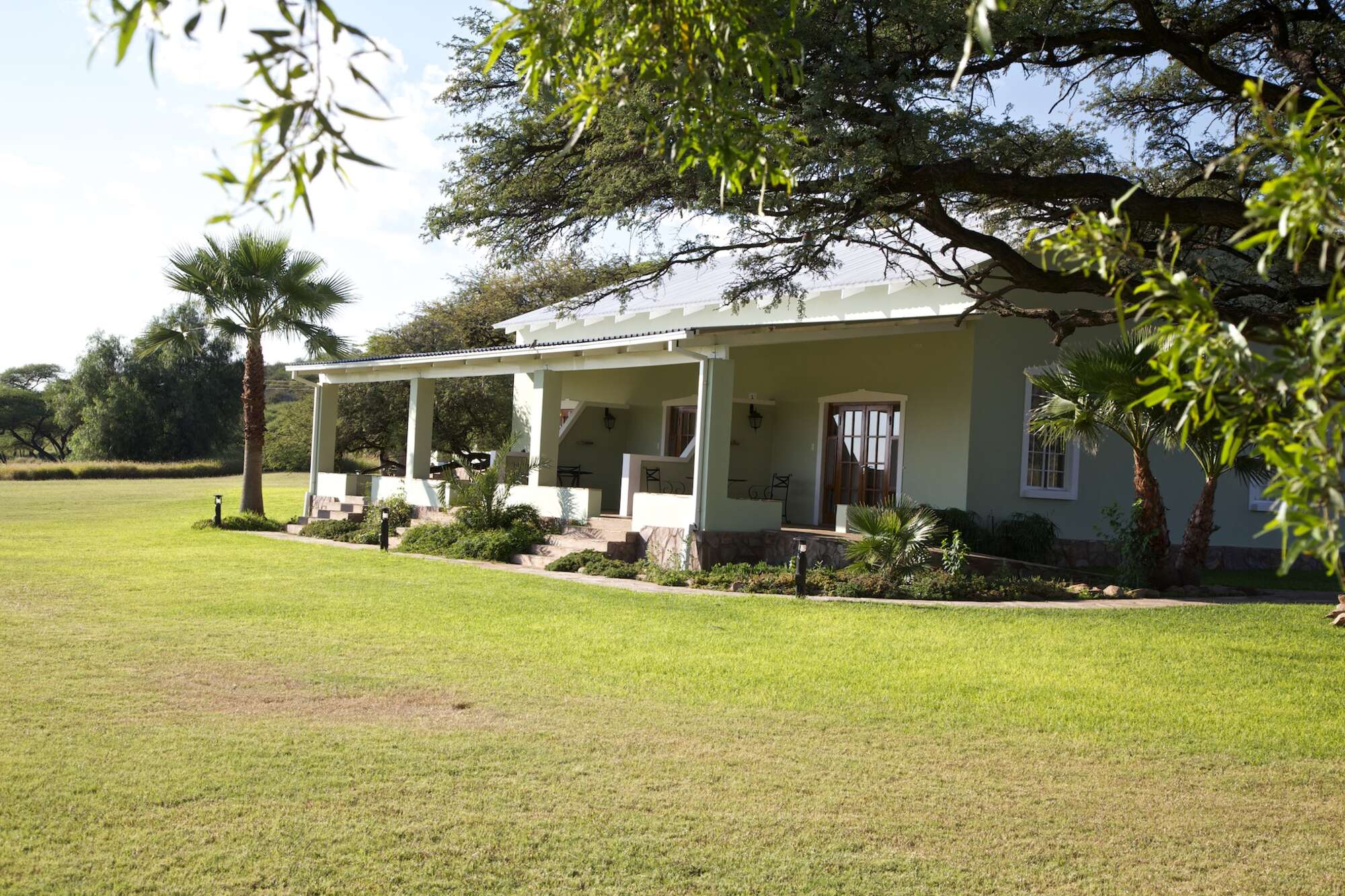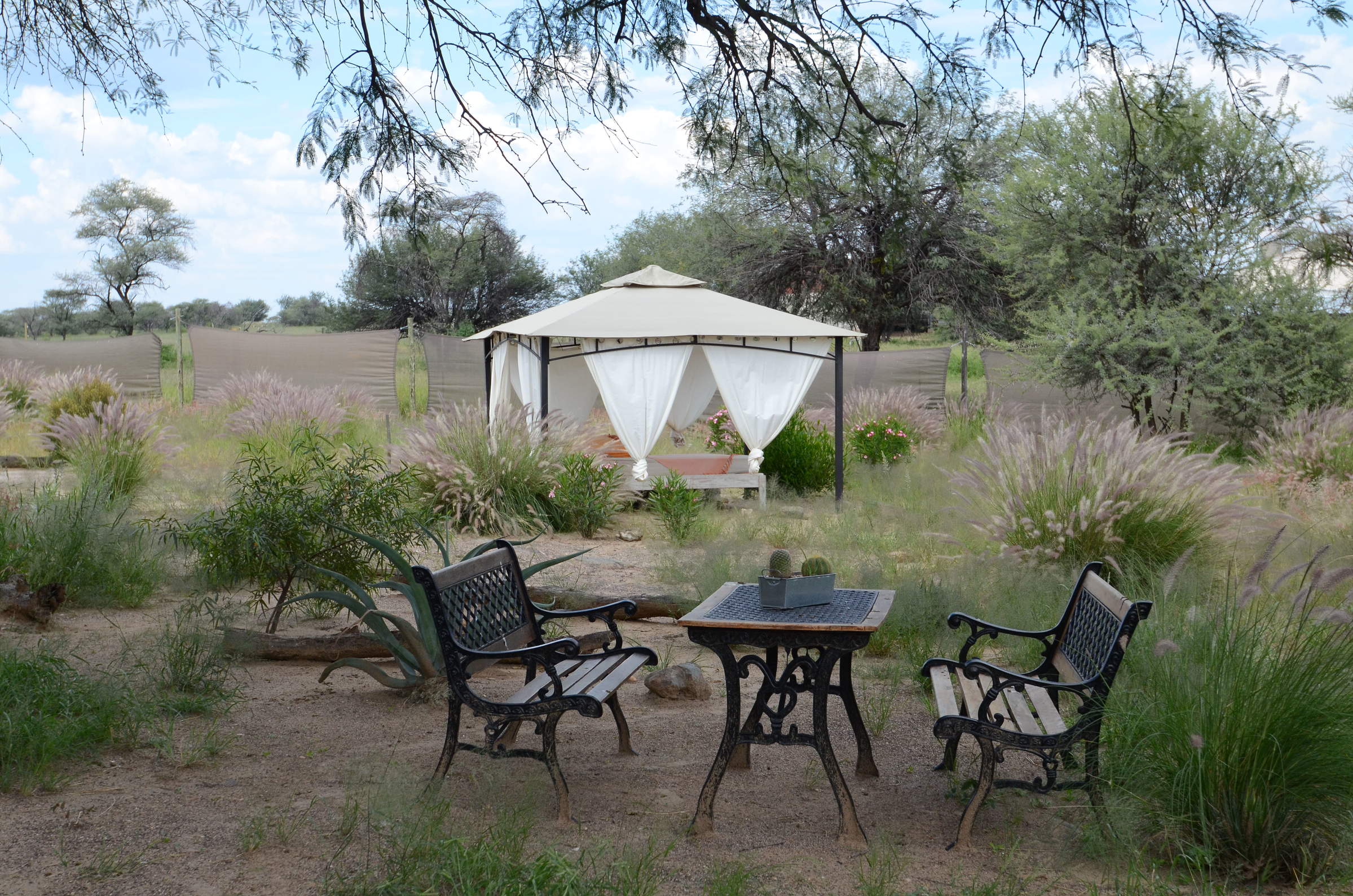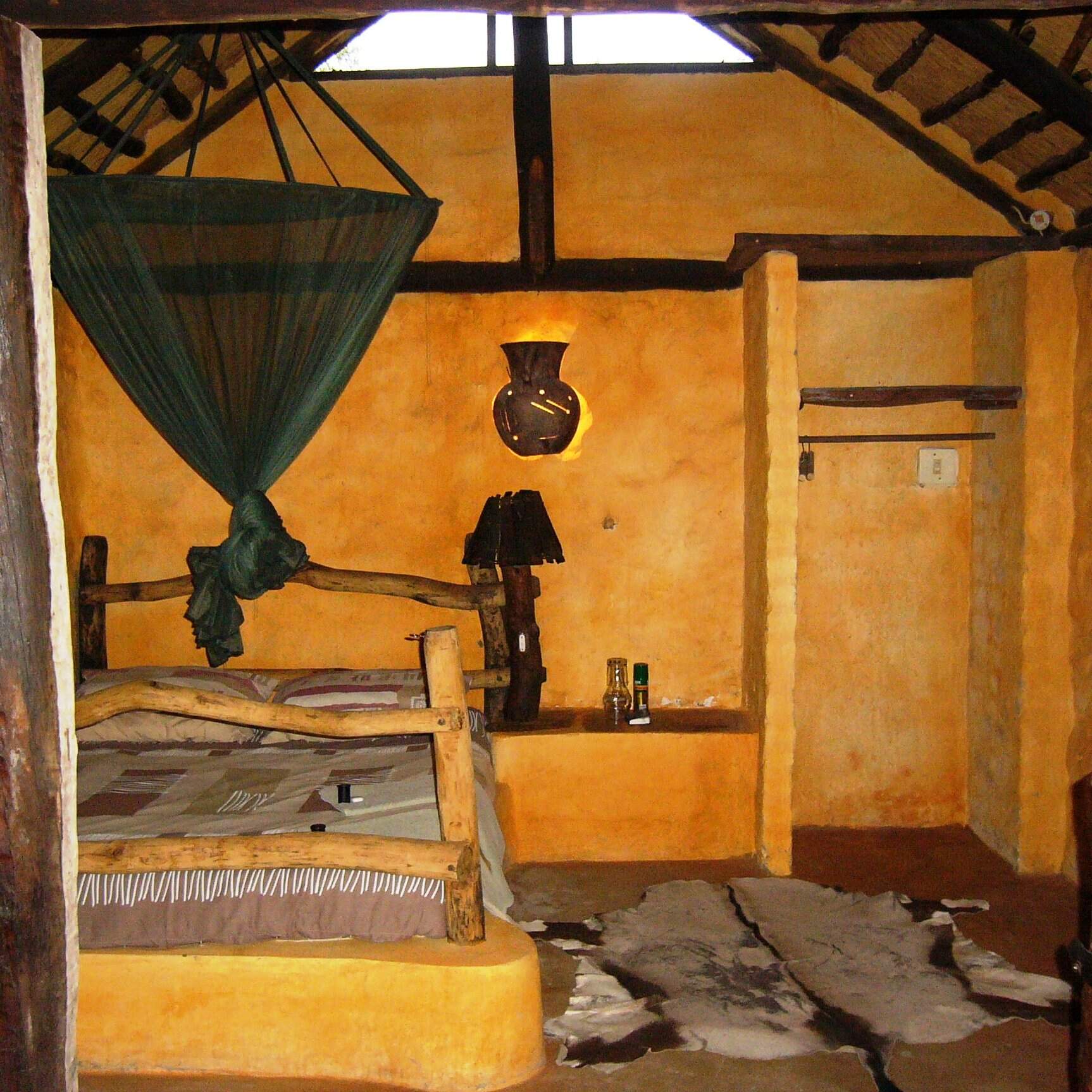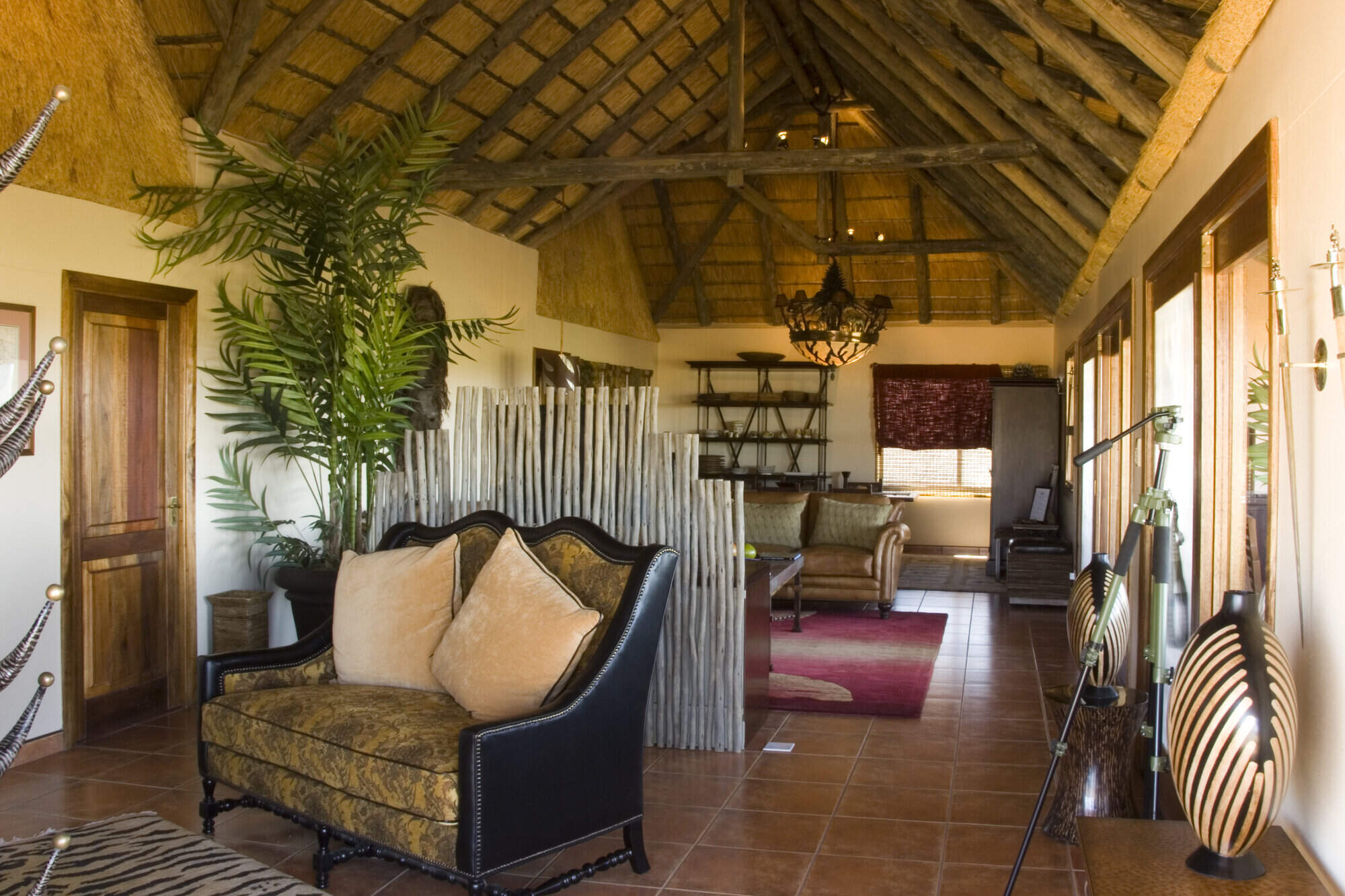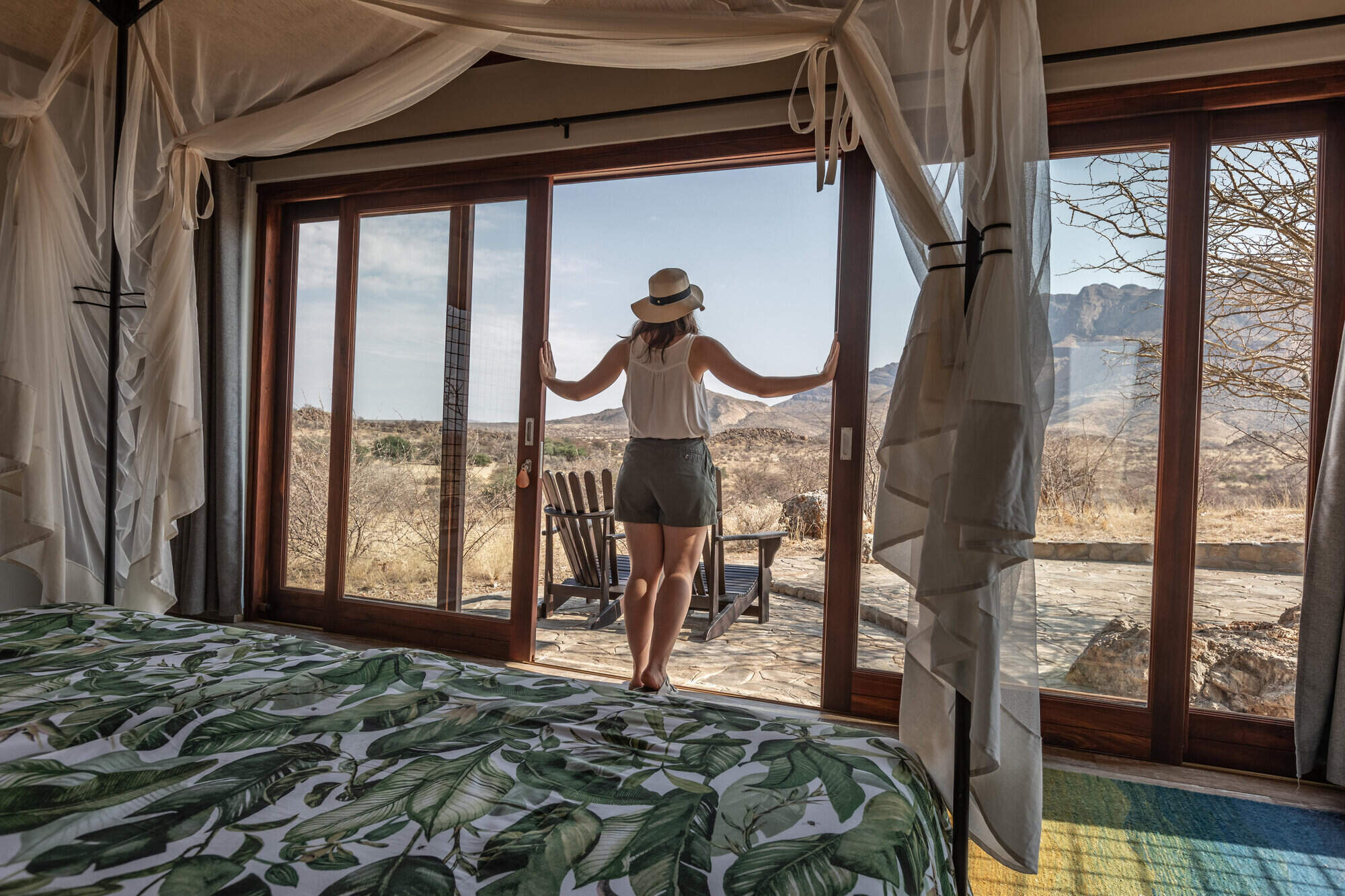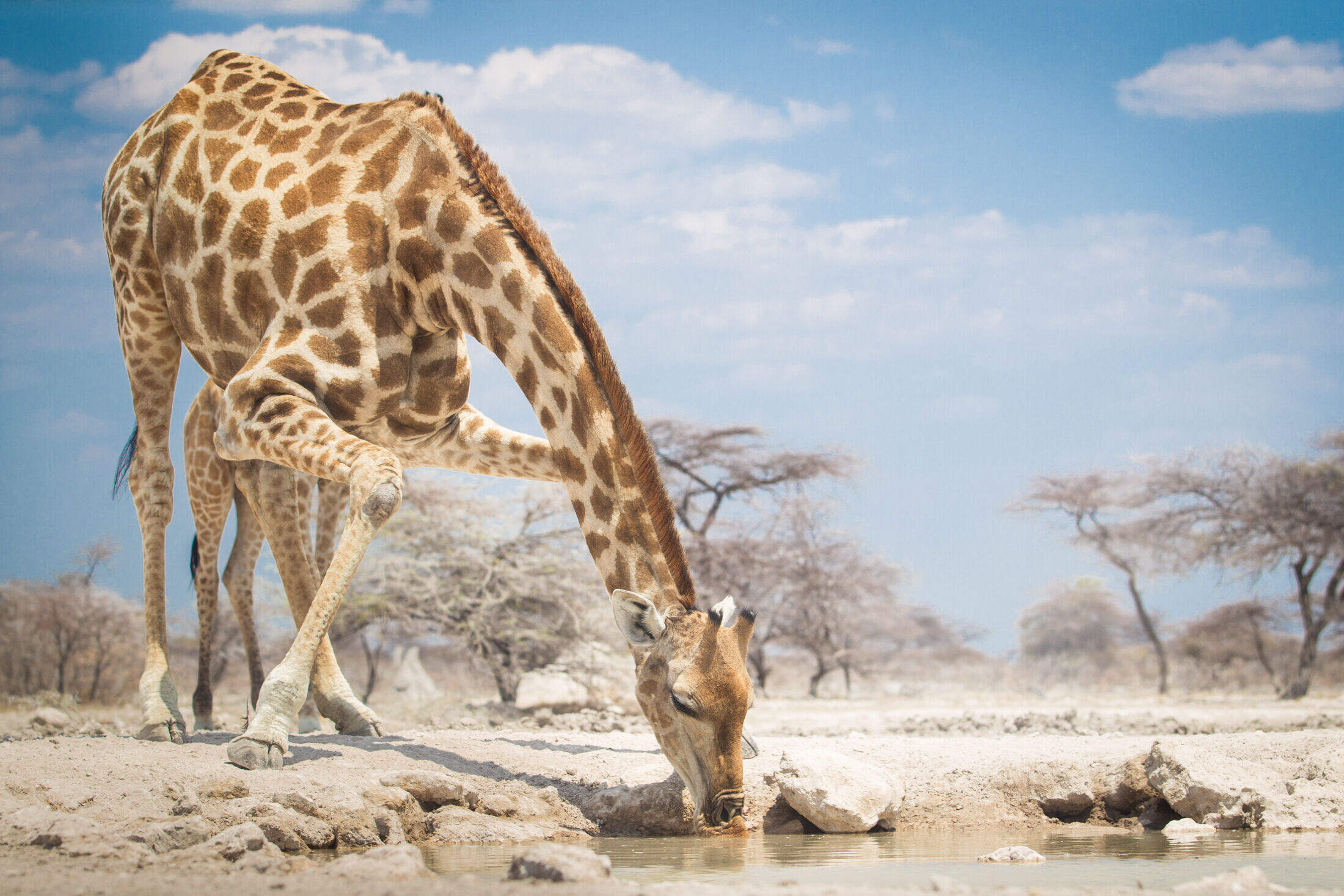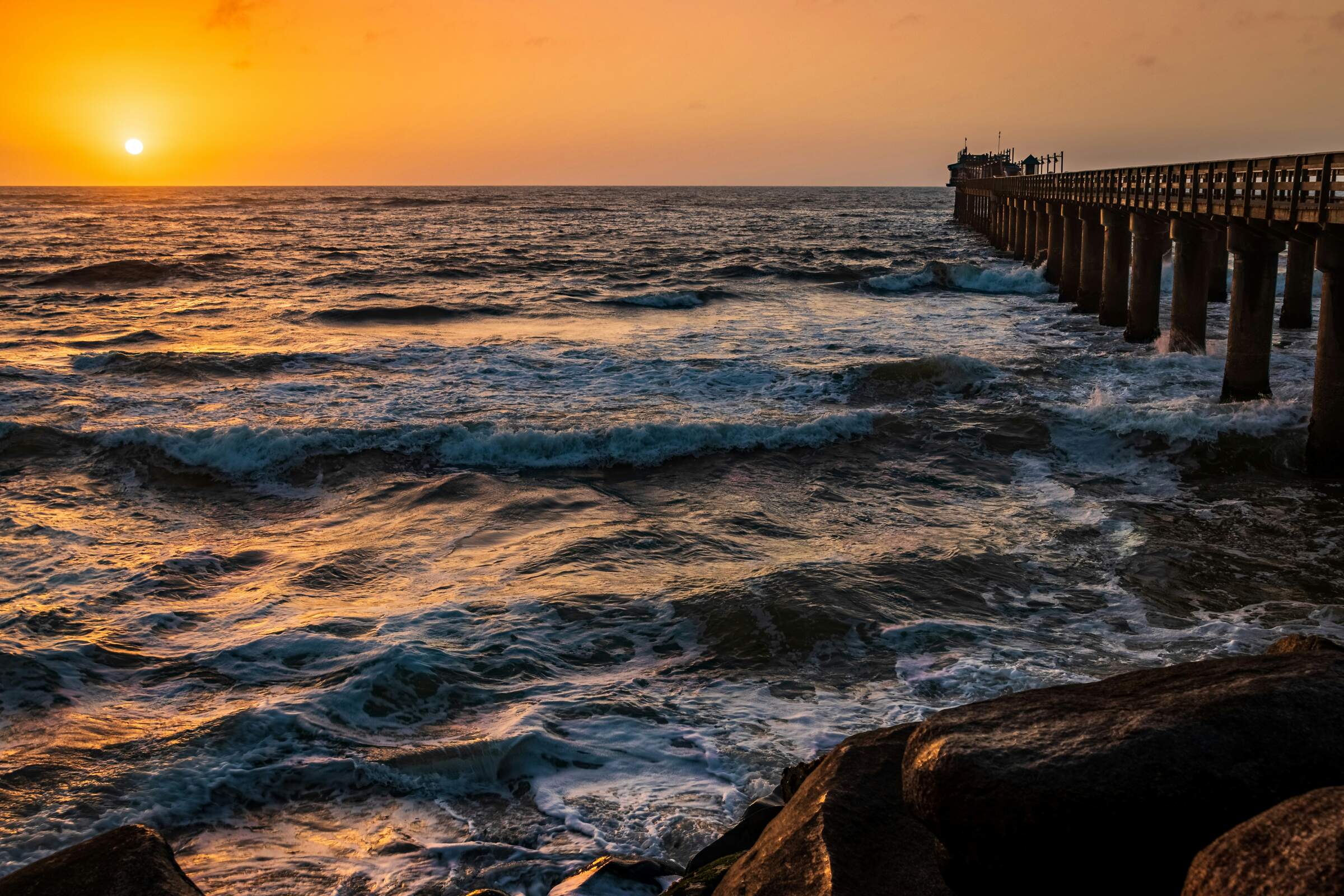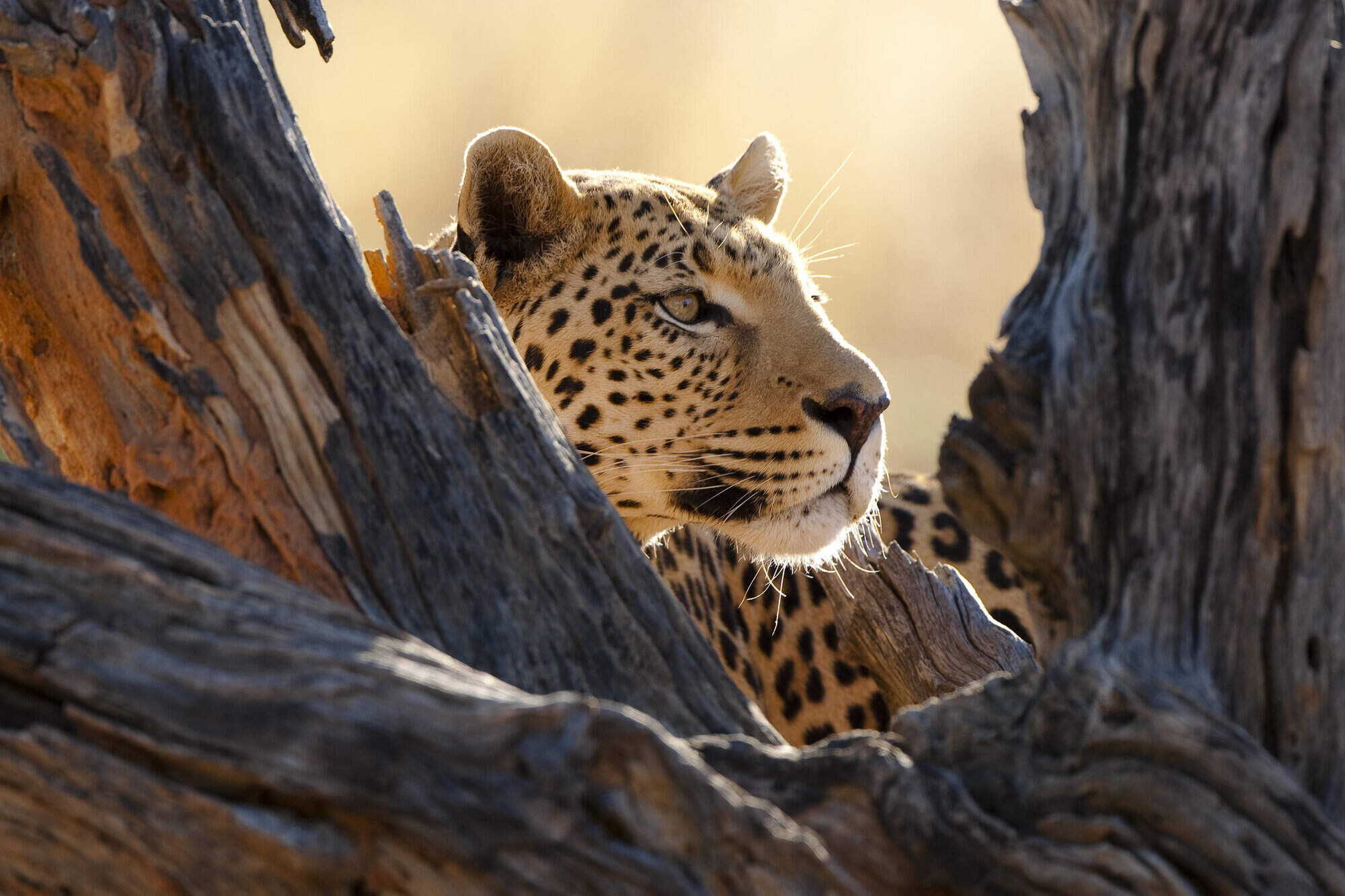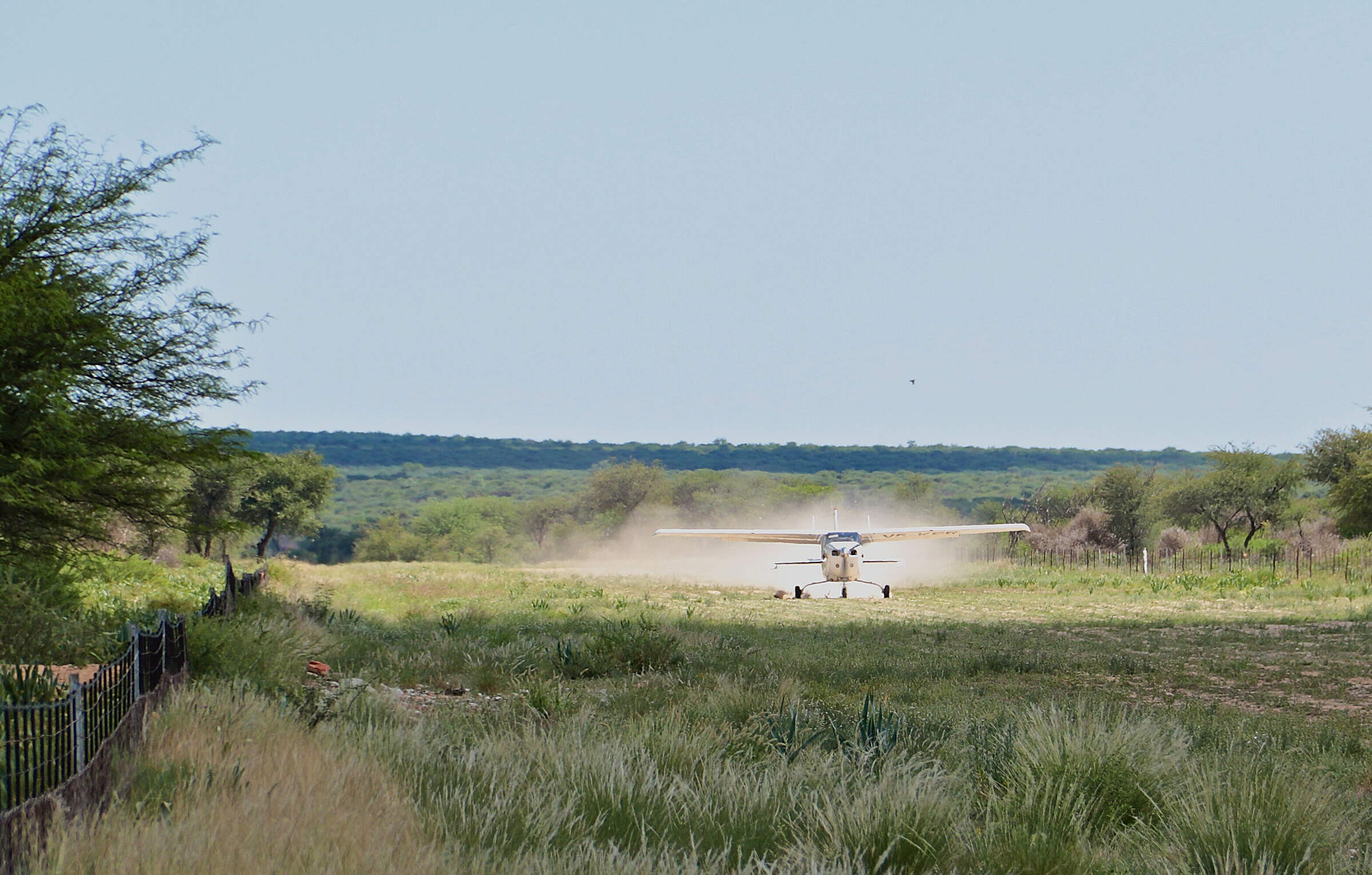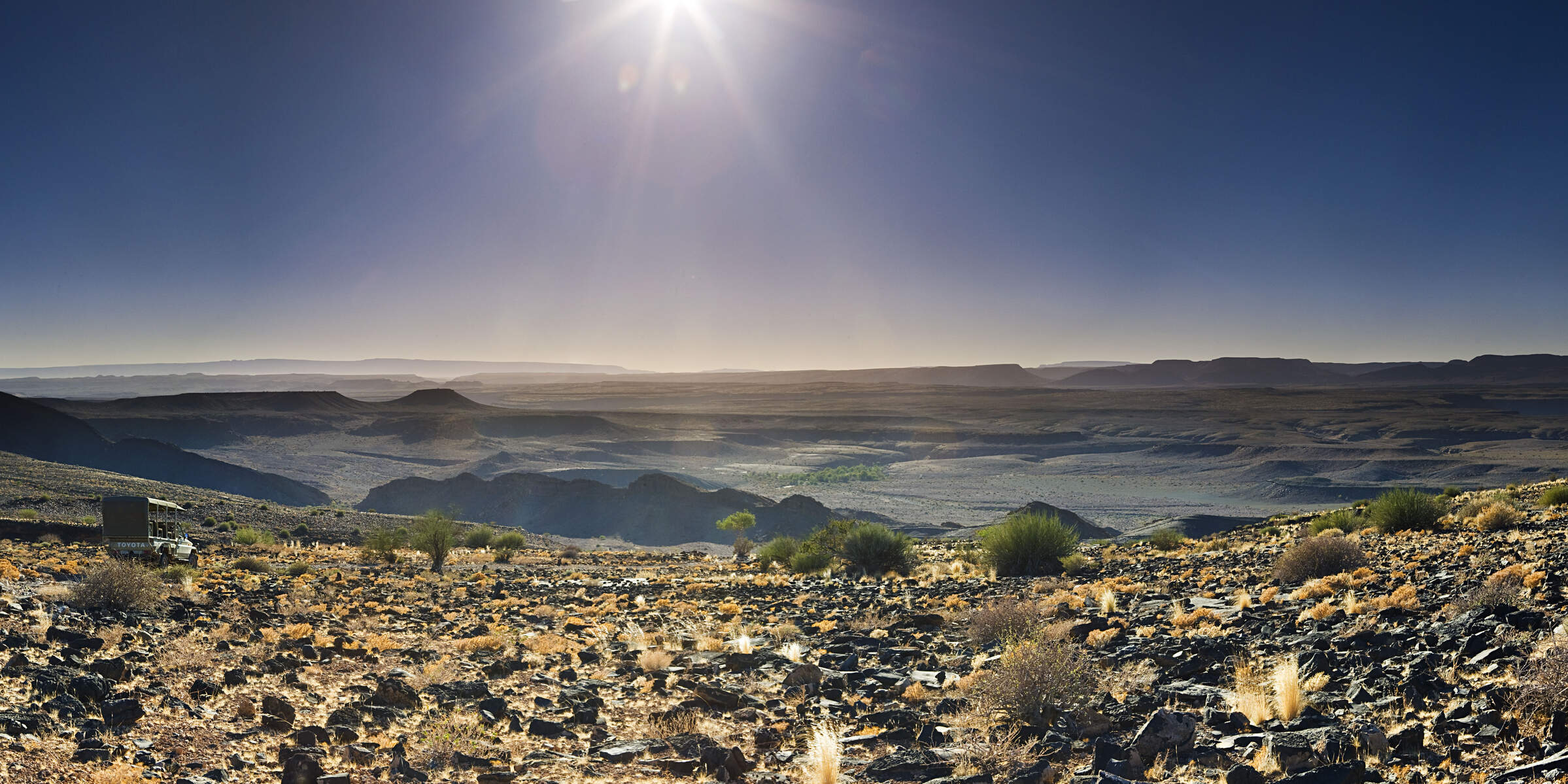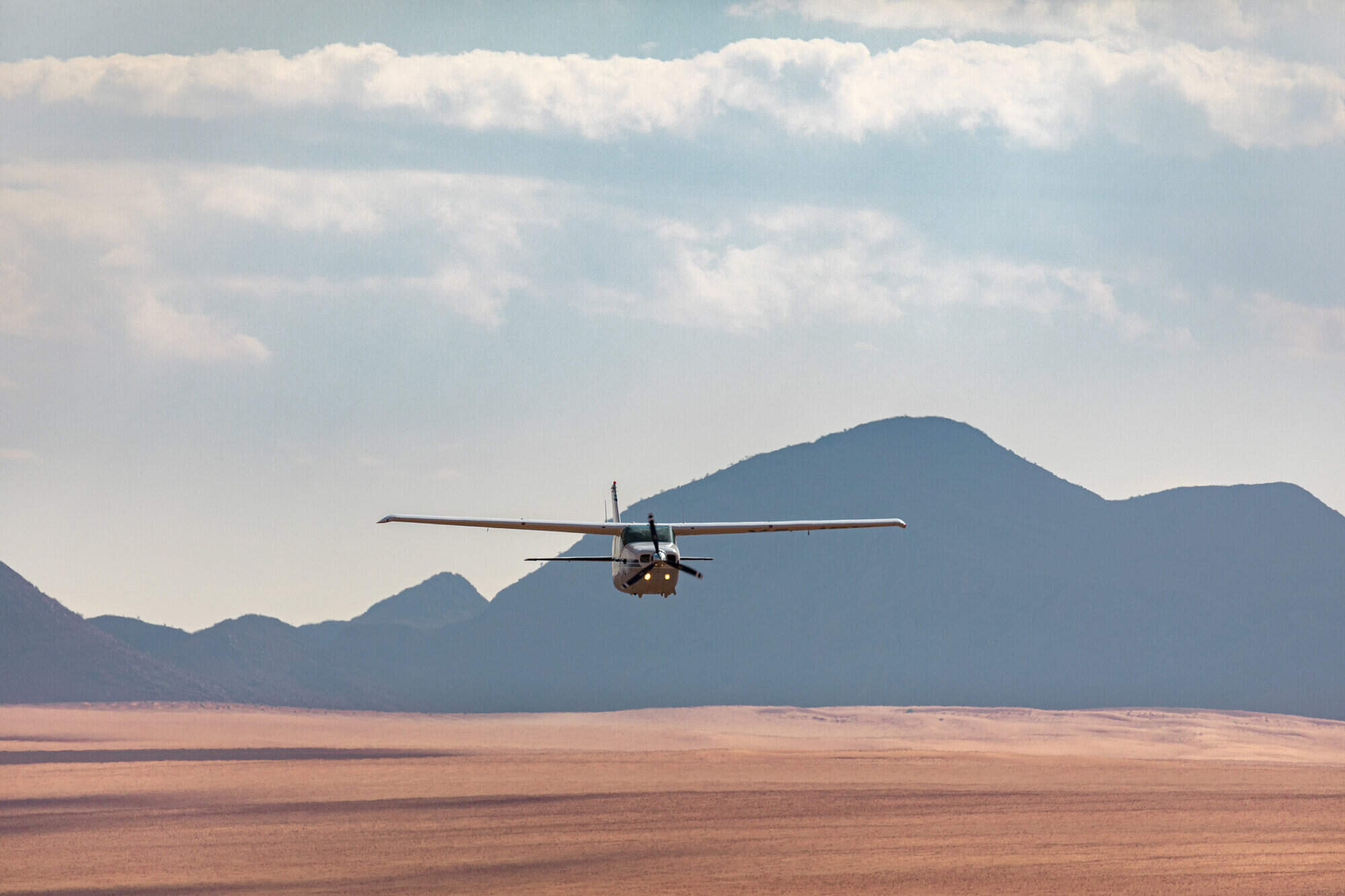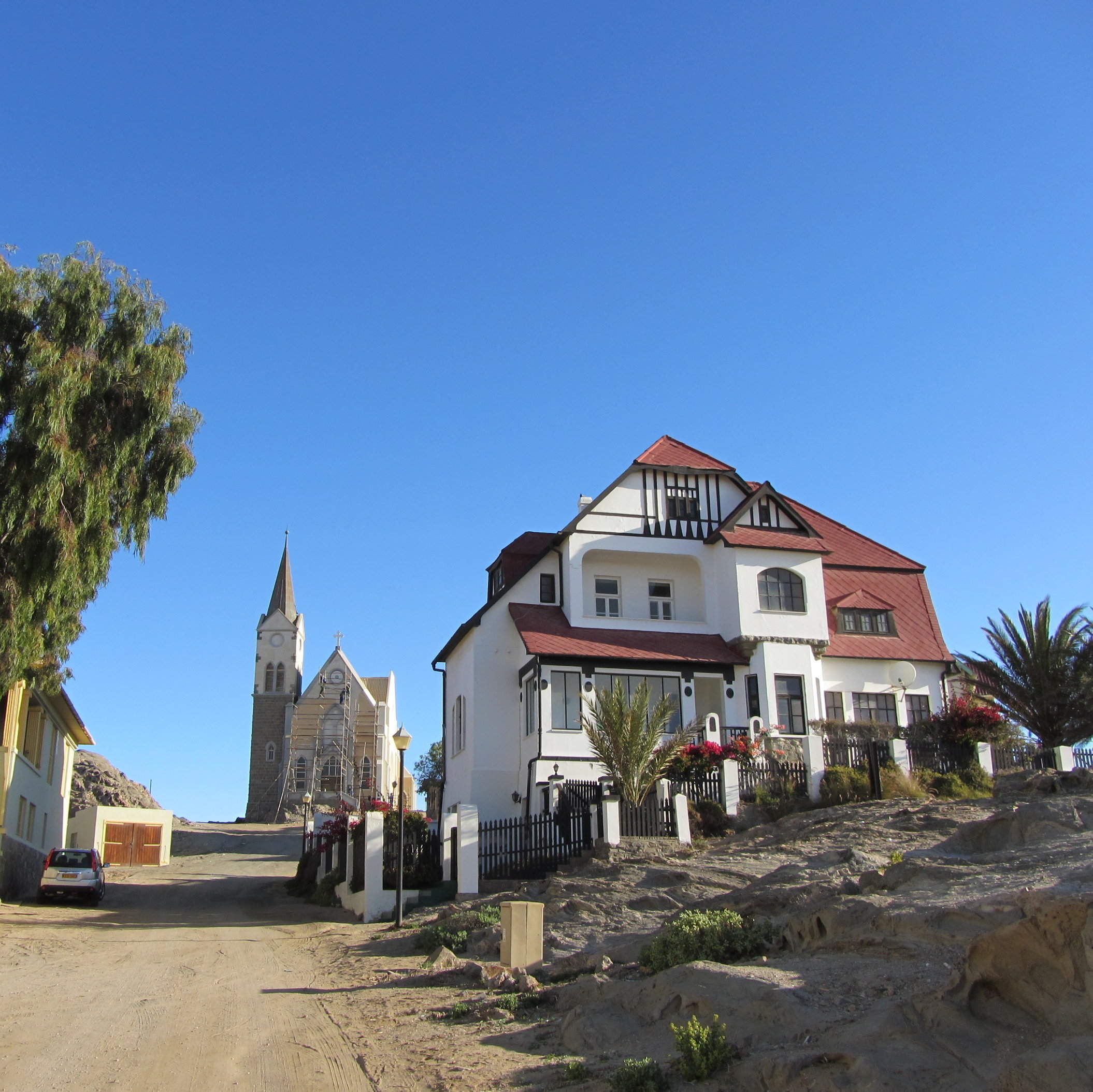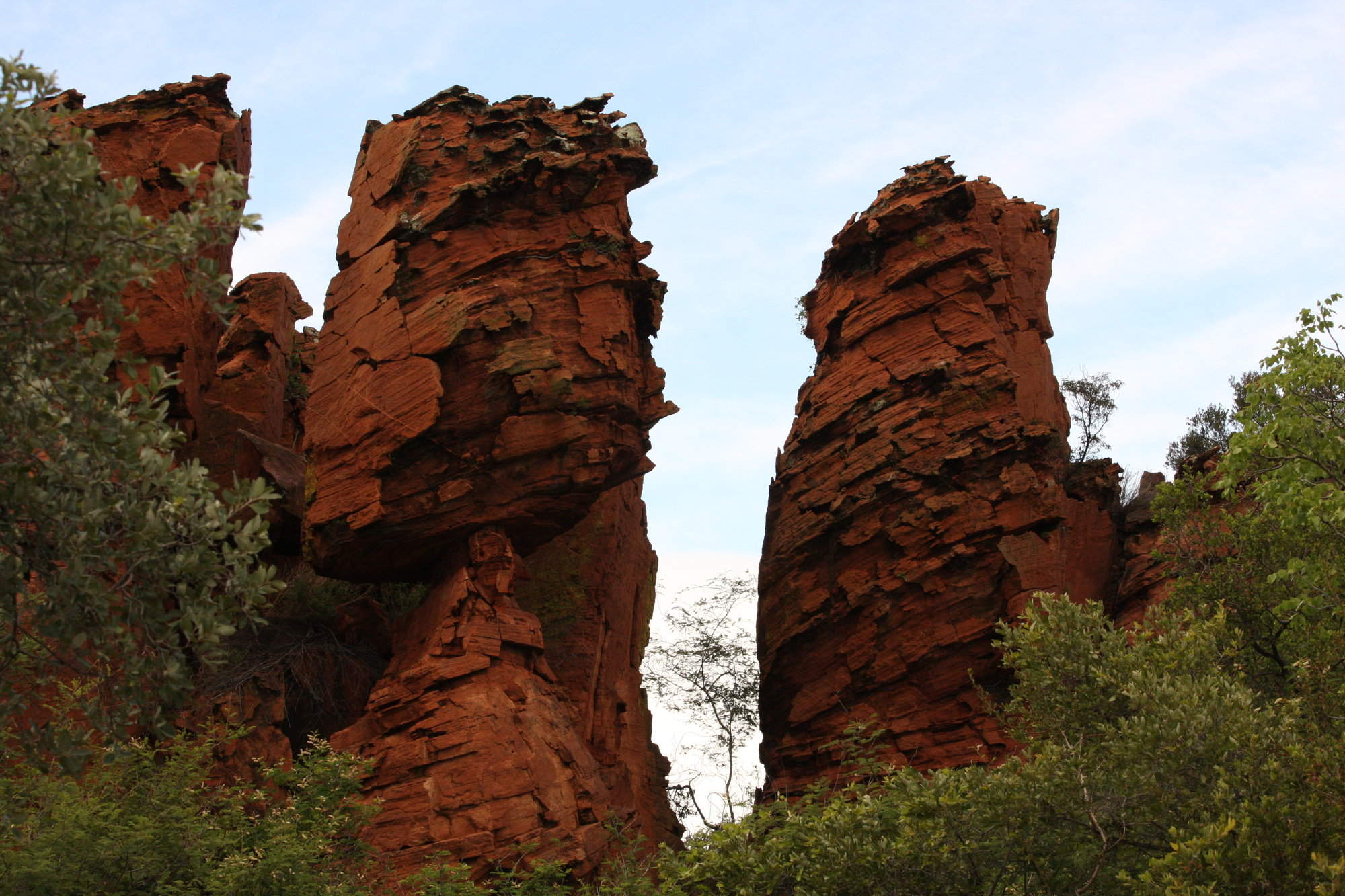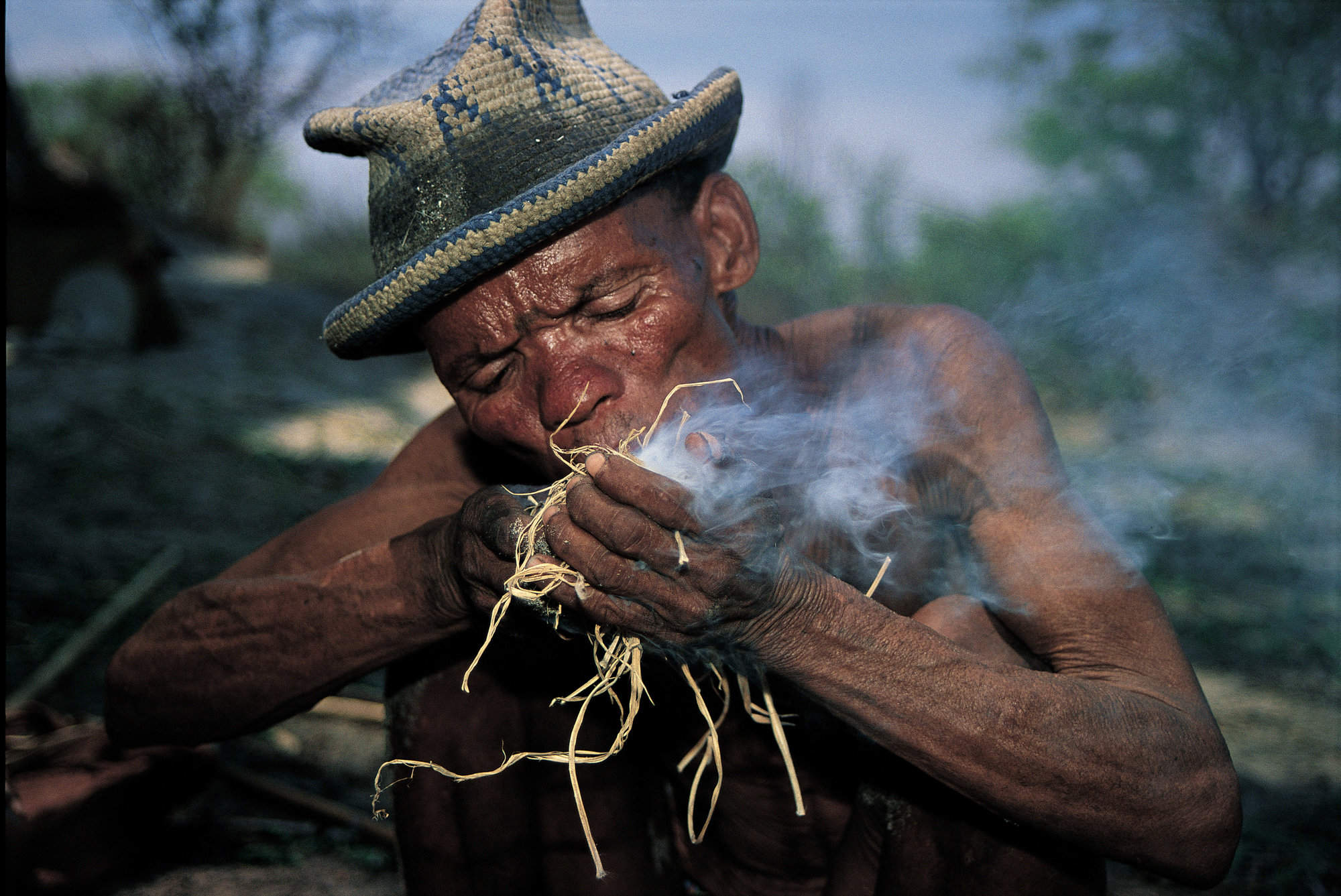Mundulea Reserve: Our full report
The 120km² Mundulea Nature Reserve was established by Bruno and Kate Nebe in 2001.
Since then, the four former cattle ranches that make up the reserve have been gradually restored and re-wilded, a process that is still ongoing. The reserve is now home to thriving and diverse populations of game, including several threatened and endemic species. Guests – limited to a maximum of eight – normally spend four days exploring the reserve on foot (game drives are not offered here) with expert guides, returning each evening to a comfortable bush camp.Mundulea is named after a beautiful purple flowering bush, Mundulea sericea, favourite food of the rhino, eland and kudu – and said to be possessed of healing and magical powers. Namibian rarities here include roan antelope, tsessebe and black-faced impala, alongside more widely known species such as cheetah, leopard, brown and spotted hyena, kudu, oryx, eland, wildebeest, Hartmann’s mountain zebra and giraffe. In addition, you are likely to come across some of the smaller animals of the bush, such as banded mongoose, bushbabies, aardvark and dik-dik, which make walking, sitting quietly at the waterhole or simply being outside in the evening such a delight. If you are particularly lucky you may get the chance to see the rare and elusive pangolin – subject of an ongoing and ground-breaking research project at Mundulea – which would be a memorable bonus.
Yet this is not a camp to visit exclusively for the wildlife – or indeed for the excellent birdlife. Rather, come for the walking, the environment, the highly personal approach, and most of all for the expert guiding – as we did once again on our last visit in September 2018. Bruno is one of the best guides in Africa, passionate about every aspect of nature and conservation, with a broad knowledge of topics that range from animal husbandry to rock art to geology to local politics – and much more. Add to this an extraordinary ability to enthuse and you have an experience that – for visitors of almost any age – is hard to match. So while wildlife sightings are by no means guaranteed, the animals that you do see will be quietly going about their own business, and seeing them on foot will give you a unique perspective on their behaviour.
The bushcamp itself is cosy and rustic, surrounded by stick palings like a traditional Ovambo homestead. At night, it is transformed by the flickering light of candles, though there is solar-powered light if needed. At the heart of the largely open-air sitting area, meals are prepared over an open fire and eaten at a massive dining table built around a tree trunk, with beautiful heavy leadwood chairs – all handcrafted, like most of the camp's furniture, in Bruno's workshop. A wrought-iron firepit is an inviting spot for pre-dinner drinks, and a small library of well-thumbed books is testament to Bruno’s broad interests in Namibia's fauna, flora, geology and much more.
A stroll away from here are just four spacious walk-in tents, making Mundulea feel intimate and personal. Large mesh windows provide light and air into your tent – or can be zipped up if preferred. Twin beds are topped with goosedown duvets – light ones for the summer months, and thicker for wintertime, with hot-water bottles for good measure. Bottled water, insect spray and torches are provided, as well as solar-powered bedside lamps.
The en-suite bathrooms are open air, built among the trees and totally private, each with a shower, flush toilet and handbasin. Water is heated by a traditional “donkey” boiler, which burns only invasive brushwood.
At the front of each tent is a big porch set with heavy chairs, but for watching wildlife and birds, wander over to one of the two small hides nearby that overlook a waterhole.
Walking among Mundulea's ancient hills riddled with caverns and deep gorges is the main activity here – and particularly welcome for those who may have been cooped up in vehicles on safari in Etosha. Each day is geared to the interests and abilities of the guests, with trails that range from gentle ambles to more rigorous hikes: flexibility is the key. Usually, you’ll enjoy two walks a day, returning from the morning excursion in time for lunch and relaxation in the hottest part of the day before setting out again in the afternoon. However those who wish can go out for a full day with a packed lunch, though generally this is recommended only in the cooler months, July –September.
Bruno has often referred to Mundulea as primarily a conservation project rather than a tourism enterprise. As such your visit will support this unique project and you can be sure that any money received goes straight into conservation and research on the reserve. Bruno is working on long-term projects with several partners worldwide, including the Royal Botanic Gardens at Kew.
Our view
Mundulea is perfectly positioned for travellers either driving from or heading to eastern Etosha. Relaxed and friendly, it's a place to explore and to discover by day, returning in the evening for in-depth discussions and storytelling around the campfire. It is best suited to those who are really into walking, and have a genuine interest in their environment. By all means come to find wildlife, but it's not a place to get up close and personal with animals; instead come for real insights into Namibian wildlife and to enjoy what we know is some of the continent's best guiding.
Geographics
- Location
- Central Highlands, Namibia
- Ideal length of stay
- Three nights/four days is the minimum stay at Mundulea, allowing for an afternoon activity on arrival, and a morning walk before you leave on the fourth day.
- Directions
- Mundulea is set in the Otavi Mountains, around 36km south of Otavi town.
Guests can drive themselves to the reserve, or can fly in by small plane to a rudimentary landing strip just outside Otavi, about 30km from Mundulea. From here, you will be collected and transferred to the camp. - Accessible by
- Self-drive or Fly-and-Transfer
Food & drink
- Usual board basis
- Full Board & Activities
- Food quality
- Homely, fresh and wholesome meals at Mundulea are usually cooked over an open fire in front of the guests – quite a feat considering the quality of the meals produced. Much of the produce, including excellent salads, is grown at the farmhouse on the reserve. As you might expect with the high level of personal service here, catering for dietary requirements is relatively easy provided enough notice is given.
Breakfast usually consists of a choice of muesli and yoghurt with fresh fruit, or perhaps a full cooked breakfast of sausage, bacon and eggs. In either case be sure to enjoy the fresh fire-baked bread: it is delicious!
lunch took the form of ultra-fresh salads (reminiscent of a Greek salad, but with extra ingredients!), with cold meat, cheese and more of that home-baked bread, rounded off with fruit salad: perfect for a hot day.
Dinner is usually a hearty meal. On our first night we enjoyed oryx fillet steak with cabbage and homemade chakalaka (a sort of South African relish). The following evening was mango chicken with rice, cabbage and steamed vegetables. - Dining style
- Group Meals
- Dining locations
- Outdoor Dining
- Further dining info, including room service
- No
- Drinks included
- Included are juice, cola, mineral water, beer, wine and gin and tonic. If you would like any other drinks let us know and we will do our best to arrange them, though this may be at extra charge.
Fresh mineral water is always on hand for you to top up your water bottle.
Special interests
- Family holidays
- Mundulea offers child-friendly guiding and a hands-on approach towards family safari holidays in Namibia. It's a great reserve for inquisitive families with active children, ideally 8+, who like walking. If the camp is taken on an exclusive basis activities can usually be tailored to suit kids.
- See ideas for Family holidays in Namibia
- Birdwatching
- Namibia's Mundulea Reserve has excellent guiding and some first-class birding. The environment ranges from kopjes to open plains, with a good variety of birds such as Rueppell's parrot, paradise flycatchers and plenty of raptors.
- See ideas for Birdwatching in Namibia
- Walking safaris
- Mundulea brings a very different perspective to a walking safari in Namibia, with one of the best guides in the business. The reserve boasts rare and unusual species, but walking safaris here are more about understanding the environment as a whole.
- See ideas for Walking safaris in Namibia
- Wildlife safaris
- Mundulea’s wildlife diversity includes large herds of eland as well as roan, tsessebe, zebra, giraffe and black-faced impala, though its walking-only policy gives a new dimension to a Namibian safari. It's also a centre for research into Namibia's endemic subspecies.
- See ideas for Wildlife safaris in Namibia
- Walking
- Walks at Mundulea are usually led by Bruno, who we rate as one of the best guides in Africa. His passion for nature and conservation, broad knowledge of topics from geology to local politics, and ability to enthuse you, make for a Namibian walking experience that’s hard to match.
- See ideas for Walking in Namibia
Children
- Attitude towards children
- Mundulea views eight years old as a sensible minimum age for younger guests, since smaller children will get tired on longer walks. This is particularly so in summer (Nov-Apr) when the grass can be quite high and temperatures more demanding. If families would like to come to Mundulea with children younger than eight, ask us for a private booking, so that the activities can be arranged entirely around your family and children.
- Property’s age restrictions
- Mundulea accepts children on a case-by-case basis, with eight years generally considered the minimum age.
- Special activities & services
- None, although activities are flexible and can be tailored to suit families with children.
- Equipment
- None
- Generally recommended for children
- Yes, as long as the children can walk for at least two hours at a stretch. Small groups mean that activities can usually be tailored around children's needs, and guides will spend time helping children to understand “how nature works”.
- Notes
- Children must be under the constant supervision of their parents, both for safety reasons and for the consideration of other guests in camp.
Our travellers’ wildlife sightings from Mundulea Reserve
Since mid-2018, many of our travellers who stayed at Mundulea Reserve have kindly recorded their wildlife sightings and shared them with us. The results are below. Click an animal to see more, and here to see more on our methodology.

100% success

96% success

91% success

91% success

50% success

24% success

5% success

5% success

5% success

5% success

0% success

0% success

0% success
Communications
- Power supply notes
- There are no sockets in the tents but guests can charge camera batteries etc in the main area during the day.
- Communications
- There is a satellite phone for emergencies, but otherwise you are effectively out of communication.
- TV & radio
- No
- Water supply
- Borehole
- Water supply notes
- Each room has a flush toilet and hot and cold running water.
Sustainability
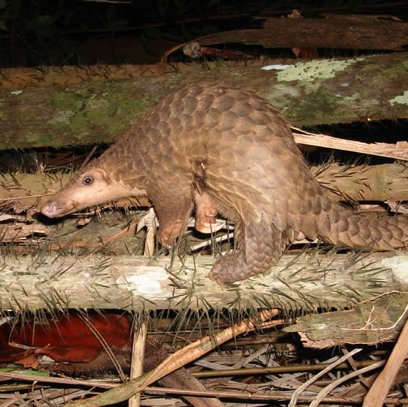
Mundulea Reserve: Pioneering pangolin research
Established with one clear goal: to protect bio-diversity and provide breathing and breeding space to Namibia’s rare sub-species, Mundulea Nature Reserve is a safe haven for over 260 species, having already re-introduced eleven species to this once game rich area.
Perhaps the most visible work towards achieving its sustainability goal is the reserve’s efforts towards researching the behaviour of pangolins, one of the most endangered groups of mammals in the world as a result of illegal wildlife trade.
The reserve collaborates closely with Namibia Animal Rehabilitation Research and Education Centre to use the bushcamp to release rescued pangolins.
Following consistent attempts to design and test tracking methods, in August 2011 Mundulea Nature Reserve became the first Southern African conservation body to tag and release a pangolin into the wild. Since then, numerous partnerships have been formed to contribute to international research efforts. The reserve supports charities such as Save Pangolins, and is an honorary member of African Pangolin Working Group, constantly participating in international conferences.
Mundulea also provides books and articles in the main sitting areas to educate tourists on the conservation of pangolins and the challenges of tracking them in the Namibian bush. Moreover, all the tours are provided by the reserve’s owner, Bruno Nebe, the initiator of the reserve’s sustainability programmes, offering a chance to learn first-hand about the behaviour of pangolins. Outside the camp, in order to reduce pollution and minimise disturbance to animals, driving is prohibited and no activities are allowed at night.
While important progress was made towards researching the behaviour of pangolins, there are consistent efforts put into achieving the long-term objective of developing a national strategy for Namibia for better legislation to protect pangolins.
See more great sustainability projects in Namibia
Health & safety
- Malarial protection recommended
- Yes
- Medical care
- Guides are trained to use both the first-aid kit in camp, and the emergency first-aid kit carried on walks. The nearest doctor is at Otavi, and can be contacted via sat phone. In the event of an emergency, guests could be airlifted from Mundulea.
- Dangerous animals
- High Risk
- Security measures
- During your stay your hosts will stay at the camp and is always available in case of an emergency.
- Fire safety
- There are fire extinguishers in all tents.
Activities
Birdwatching
Guided walking safari
Private activities
Extras
- Disabled access
- On Request
- Laundry facilities
- No laundry facilities
- Money
- With the exceptions of tips there is little need for money here as everything is included in your stay.
- Accepted payment on location
- Not required, tips are always greatly received in South African rand or Namibian dollars (of course they are discretionary).
Other lodges in Central Highlands
Alternative places to stay in this same area.
